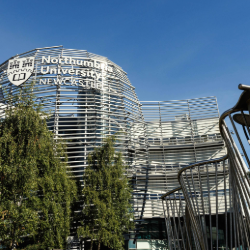-
Study
-
Quick Links
- Course Search
- Fees and Funding
- Unlock Your Potential
- Still time to Apply
- Higher and Degree Apprenticeships
- Continuing Professional Development
- Still time to apply
-
Undergraduate
- Application Guides
- UCAS Exhibitions
- Foundation Years
- School & College Outreach
- Information for Parents
-
Postgraduate
- Application Guide
- Postgraduate Research Degrees
- Flexible Learning
- Change Direction
- Register your Interest
-
-
International
International
Northumbria’s global footprint touches every continent across the world, through our global partnerships across 17 institutions in 10 countries, to our 277,000 strong alumni community and 150 recruitment partners – we prepare our students for the challenges of tomorrow. Discover more about how to join Northumbria’s global family or our partnerships.
View our Global Footprint-
Quick Links
- Course Search
- Undergraduate Study
- Postgraduate Study
- Information for Parents
- London Campus
- Northumbria Pathway
- Cost of Living
- Sign up for Information
-
International Students
- Information for Students
- International Events
- Application Guide
- Entry Requirements and Education Country Agents
- Global Offices
- English Requirements
- English Language Centre
- International student support
- Cost of Living
-
International Fees and Funding
- International Undergraduate Fees
- International Undergraduate Funding
- International Masters Fees
- International Masters Funding
- International Postgraduate Research Fees
- International Postgraduate Research Funding
-
International Partners
- Agent and Representatives Network
- Global Partnerships
- Global Community
-
International Mobility
- Information for Northumbria Students
- Information for Incoming Exchange Students
-
-
Business
Business
The world is changing faster than ever before. The future is there to be won by organisations who find ways to turn today's possibilities into tomorrows competitive edge. In a connected world, collaboration can be the key to success.
More on our Business Services -
Research
Research
Northumbria is a research-rich, business-focused, professional university with a global reputation for academic quality. We conduct ground-breaking research that is responsive to the science & technology, health & well being, economic and social and arts & cultural needs for the communities
Discover more about our Research -
About Us
-
About Northumbria
- Our Strategy
- Our Staff
- Place and Partnerships
- Leadership & Governance
- Academic Departments
- University Services
- History of Northumbria
- Contact us
- Online Shop
-
-
Alumni
Alumni
Northumbria University is renowned for the calibre of its business-ready graduates. Our alumni network has over 246,000 graduates based in 178 countries worldwide in a range of sectors, our alumni are making a real impact on the world.
Our Alumni - Work For Us
What will I learn on this module?
You will learn about vector calculus and tensor analysis and their applications in ‘Vector Calculus and Further Dynamics’. These powerful mathematical methods provide convenient tools for the description and analysis of the physical world. You will be introduced to the fundamentals of vector calculus and Cartesian tensors, as well as their application to the development and analytical solution of problems in rigid body dynamics. Throughout, the real-world motivation for the techniques chosen and the interpretation of the solutions will be emphasised.
You will learn about mathematical concepts such as:
• Line, surface and volume integrals;
• Vector fields and operators, including Gauss' (Divergence) Theorem, Stokes' Theorem and the Transport Theorem;
• Introduction to Cartesian tensors.
You will be applying these powerful mathematical techniques to planetary motion and rigid body dynamics in ‘Vector Calculus and Further Dynamics’. By studying point particle motion you will become acquainted with the fundamental concepts of central forces and through the application of the principles of linear and angular momentum you will be investigating the dynamics of rigid bodies.
How will I learn on this module?
You will learn by attending regular lectures, with weekly seminars that complement the taught material by providing assistance with problem solving associated with ‘Vector Calculus and Further Dynamics’. Computer laboratory sessions will be used as deemed appropriate to complement and enhance your understanding of the mathematical concepts and techniques.
How will I be supported academically on this module?
You will be supported by regular feedback during the seminars. In addition to direct contact with the module team during lectures and seminars, students are encouraged to develop their curiosity by making direct contact with the module team either via email or the open door policy operated throughout the programme. Supporting material will be placed on the e-learning portal of the university.
What will I be expected to read on this module?
All modules at Northumbria include a range of reading materials that students are expected to engage with. Online reading lists (provided after enrolment) give you access to your reading material for your modules. The Library works in partnership with your module tutors to ensure you have access to the material that you need.
What will I be expected to achieve?
Knowledge & Understanding:
1. You will be able to discern the appropriate vector calculus techniques and manipulate Cartesian tensors.
2. You will be applying these techniques in the context of the motion of heavenly and rigid bodies.
Intellectual / Professional skills & abilities:
3. You will be able to select the appropriate techniques for problem solving in vector calculus and dynamics.
4. You will be able to interpret and critically evaluate your obtained results.
Personal Values Attributes (Global / Cultural awareness, Ethics, Curiosity) (PVA):
5. Your ability for critical enquiry and evaluation of vector calculus and its application in dynamics will be evident from your ability to address new problems and to work independently.
How will I be assessed?
SUMMATIVE
1. Coursework (30%) – 1, 2, 3, 4, 5
2. Examination (70%) – 1, 2, 3, 4, 5
FORMATIVE
Seminar problems – 1, 2, 3, 4, 5
Summative assessment consists of two parts. You will be given a coursework at mid-semester (30%) that covers vector calculus and tensors. You will also sit a formal examination at the end of the semester (70%) that will address the appropriate application of the mathematical techniques, in particular to the dynamics of heavenly and rigid bodies.
You will be given formative feedback throughout by the tutor in seminars and/or computer laboratory sessions. You will receive both written and oral feedback after the in-course test. After the examination you will receive personalised feedback by allowing you access to your fully-commented answer script.
Pre-requisite(s)
None
Co-requisite(s)
None
Module abstract
In ‘Vector Calculus and Further Dynamics’ you will be introduced to the powerful mathematical techniques of vector calculus and tensor analysis. Once you have mastered these techniques, you will be applying them in analysing movement of heavenly bodies in the gravitational field of a star. You will also apply the principles of linear and angular momentum to analyse the movement of rigid bodies in three-dimensional space.
You will be attending formal lectures and, in smaller groups, practical seminars during which you will be solving set problems under the supervision of a tutor. Assessment is by a mid-semester coursework (30%) and by a formal examination (70%). ‘Vector Calculus and Further Dynamics’ is designed to provide students with a useful preparation for employment or postgraduate study in an applied mathematical or engineering environment.
Course info
UCAS Code G101
Credits 20
Level of Study Undergraduate
Mode of Study 4 years Full Time or 5 years with a placement (sandwich)/study abroad
Department Mathematics, Physics and Electrical Engineering
Location City Campus, Northumbria University
City Newcastle
Start September 2025 or September 2026
All information is accurate at the time of sharing.
Full time Courses are primarily delivered via on-campus face to face learning but could include elements of online learning. Most courses run as planned and as promoted on our website and via our marketing materials, but if there are any substantial changes (as determined by the Competition and Markets Authority) to a course or there is the potential that course may be withdrawn, we will notify all affected applicants as soon as possible with advice and guidance regarding their options. It is also important to be aware that optional modules listed on course pages may be subject to change depending on uptake numbers each year.
Contact time is subject to increase or decrease in line with possible restrictions imposed by the government or the University in the interest of maintaining the health and safety and wellbeing of students, staff, and visitors if this is deemed necessary in future.
Useful Links
Find out about our distinctive approach at
www.northumbria.ac.uk/exp
Admissions Terms and Conditions
northumbria.ac.uk/terms
Fees and Funding
northumbria.ac.uk/fees
Admissions Policy
northumbria.ac.uk/adpolicy
Admissions Complaints Policy
northumbria.ac.uk/complaints









